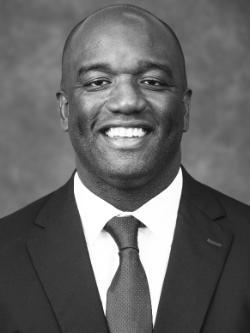In the spring of 2010, when Longwood was still in the process of seeking to join a Division I conference, I left the office of a fellow athletics director with some blunt and discouraging feedback. Essentially, this AD told me Longwood wasn’t good enough to join the Big South Conference and would not endorse us for membership.
At this point, I had spent five years as a Division I independent. It wasn’t the first time I had been turned down by another AD, but it was by far the most critical and honest rejection. I was angry, frustrated and disheartened—all emotions that go hand-in-hand with failure. This also was not the first time I had experienced failure. I credit my own experience as a student-athlete at Duke University with allowing me to grow from that failure and eventually turn it into the win that followed the next year.
It has been nearly two decades since I played my last down, and I still draw on the life lessons I learned as a student-athlete at Duke. The things football taught me about myself, about being part of a team and about life changed how I thought and operated as a person. Those lessons helped me through college, they helped me after that regrettable meeting with the AD, and they help me today.
Done right, sports can shape a young person in ways she or he can’t even imagine at the time.
As an athlete, I encountered adversity and failure every single day. I am not alone in that experience. Now in my 12th year as athletics director at Longwood, I see firsthand the influence college athletics has on young people and how they carry those lessons with them long after their last game.
One of Longwood’s own, Brian McCullough, is one of the greatest failure-turned-success stories I have encountered here. Brian was recruited to pitch at Longwood under legendary head baseball coach Buddy Bolding in 2004. However, like many freshmen, he found out quickly that it takes more than talent to succeed at the college level.
Brian’s freshman season was disappointing, to say the least. Buddy bluntly explained in his postseason evaluation that Brian’s playing time would be severely diminished if his performance didn’t improve. As is characteristic of great competitors, Brian did not give up. Instead, he took Buddy’s advice to overhaul his delivery.
Completely changing the way he threw a baseball was no small task for a talented player like Brian, who had spent his entire career throwing overhand. The summer after his freshman season, Brian adopted a sidearm delivery. Through his hard work and commitment, he became a reliable relief pitcher as a sophomore. The more Brian bought into his reinvention as a pitcher, the better he became. As a junior and senior, he earned Division I Independent Pitcher of the Year honors.
Brian’s story is an allegory for Longwood’s early Division I experience, and I drew inspiration from it after my disappointing meeting in the spring of 2010. Despite my emotional response to such blunt criticism about Longwood, I was certain our teams were more than worthy of competing in the Big South—I just didn’t know how to get that message across.
Like Brian, Longwood had all the tools to succeed but needed to reinvent its delivery.
With the help of some great mentors, I overhauled my approach and spent the next 18 months visiting with leaders at peer institutions and in various conferences. That investment paid off in the summer of 2011, when I returned to meet with that straight-shooting AD armed with a new delivery. “Longwood has done a 180 in my books,” said the AD, who remains a current conference peer. “You guys have done a terrific job building a program that can compete in our conference.”
Now in our fifth year as a member of the Big South, Longwood has won three conference championships in softball while also earning multiple top-three finishes in several other sports, including baseball. Much like the high-school star who received a dose of criticism amid a disappointing freshman season, we Lancers have grown from adversity to reinvent ourselves.
About the Author

Troy Austin
Troy Austin has been Longwood’s director of athletics since 2006. He is the 2016-17 president of the Division I-AAA Athletics Director Association.


Leave a Comment